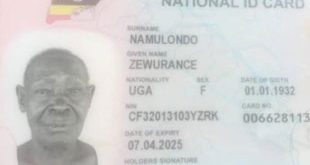
Kampala, Uganda | THE INDEPENDENT | Another Ugandan woman who had travelled to Saudi Arabia to work as a housemaid is nursing life-threatening injuries sustained during the time of her employment in the Gulf.
The victim, who requested anonymity, travelled to Saudi Arabia on a two-year contract, effective last year, through a recruitment agency in Kampala. Her travel was fully funded by Marphie International Recruitment Agency, after paying a registration fee of 50,000 Shillings and an additional 50,000 Shillings for a company shirt. She had earlier spent 300,000 Shillings to secure a passport.
The 30-year old’s travel documents show she left the country on September 19, 2018, through Entebbe International Airport, hoping for greener pastures and a life full of glee, fun and money. According to her contract, she would earn up to 900,000 Shillings a month.
Indeed, she found her prospective employers waiting to receive her at the airport, from where she was taken to their home. But before she could settle in, her passport was seized, together with her phone, as the testament has been for so many other girls who have gone to the Middle East, where they are employed as nannies and housemaids.
She was cut off from the outside world and forced her to adopt the Islamic lifestyle. Her workload required her to work for not less than 14 hours every day, single handedly running chores for the entire household. This meant that she spent more hours standing and running around, and hardly rested.
A few months into the contract, the young woman developed severe chest pain, signalling the beginning of her misery as she struggled to cope in a foreign land. She adds that during the time, she endured food deprivation, nonpayment of wages and psychological abuse.
The mother of three explains that she sought medical help when her health condition deteriorated. Here, the condition was attributed to excessive work and she was advised to relax her schedule, as part of the treatment. But the medical advice was ignored and the workload resumed as soon as she left the hospital.
Within no time, she could hardly stand. Her body became weaker and fragile.
Consequently, she pleaded with her employers to send her back home, a country she had left, in the hope of running from a hopeless situation. But at this point, the bleak Ugandan situation was far better than the idealistic hope away from home.
On February 2, 2019, she boarded a plane to Uganda, ending five months of distress. All she had was an equivalent of one month’s salary, the sole payment given to her since her arrival. Her ticket was paid for by a member of the Ugandan community in Saudi Arabia, whom she reached out for help as soon as she was released from the ‘cage’
She says that upon her arrival, she sought the intervention of the employment agency, albeit in vain.
But the company’s Human Resource Manager only identified himself as Raphael, said the case was unfamiliar to them. He was also quick to note that their agency follows up on all the people they recruit to work abroad and ensure they are in a good state.
Without money but only excruciating chest pain, the resident of Kasese is now staying with sisters that belong to the Association of Religious in Uganda – ARU Fort Portal Branch, where she is receiving treatment.
Sister Margaret Kabanywezi, the Coordinator of ARU in Fort Portal says they were touched by torture victim’s story and decided to take care of her. The association has also petitioned government institutions in the Rwenzori region, for an intervention to end issues of human trafficking.
The victim says her experience was a lesson, which she is now using to caution Ugandan girls to be very careful before leaving the country to allegedly work abroad.
Over the past few years, tens of thousands of Ugandan women have travelled to the Middle East, lured by the promise of well-paid work and an improved standard of living. However, their stay there is characterized by widespread claims of exploitation and abuse.
Often, images are shared on social media platforms, showing horrific pictures of girls who have endured torture, pleading for help to return home. Such reports had forced the government to ban its citizens from working in Jordan and Saudi Arabia in January 2016.
But the ban was lifted in June 2017 after the Ugandan government signed agreements to protect Ugandans seeking employment in Saudi Arabia and Jordan from abuse and exploitation. The agreements were purposed to improve the welfare of workers and promote their rights.
It was stipulated that maids were entitled to agreed salaries, eight-hour workdays, with breaks, as well as access to the travel documents and communication gadgets.
A report released by the Human Rights Watch in 2016 estimated that there were more than nine million migrant workers in the Middle East involved in doing manual, clerical and service jobs, which tantamount to forced labour.
According to the Rights body, the problem can be traced to the sponsorship system which ties migrant workers’ residency permits to ‘sponsoring’ employers. This implies that no worker can change employers or even exit the country without the written consent of their employer.
******
URN
 The Independent Uganda: You get the Truth we Pay the Price
The Independent Uganda: You get the Truth we Pay the Price


